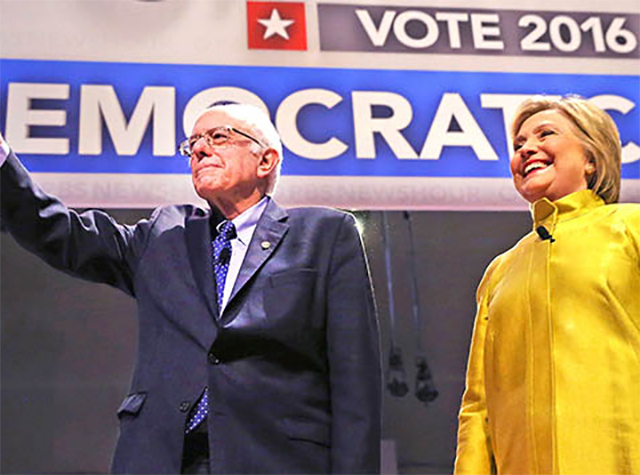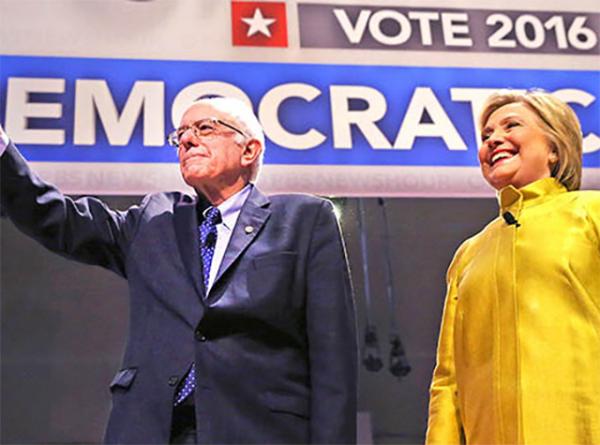KID REPORTERS’ NOTEBOOK
The Candidates Face Off Before the Next Elections


Vermont Senator Bernie Sanders and Former Secretary of State Hillary Clinton greet the crowd at the University of Wisconsin in Milwaukee. Sanders and Clinton are vying for the Democratic nomination for president.
On February 11, Vermont Senator Bernie Sanders and former Secretary of State Hillary Clinton, the top two candidates in the Democratic presidential race, held a debate at the University of Wisconsin in Milwaukee. Two days later, six top Republican candidates took the stage in Greenville, South Carolina. Scholastic News Kid Reporters covered both events.
Here is Lilian Jochmann’s account of the Democratic debate in Wisconsin.
As Senator Bernie Sanders and former Secretary of State Hillary Clinton prepared to take the stage, reporters, students, political experts, and protesters swarmed the campus of the University of Wisconsin in Milwaukee. It was freezing outside, but hundreds of people braved the cold to see the Democratic debate here.
PBS NewsHour co-anchors Judy Woodruff and Gwen Ifill moderated the two-hour debate. Behind the scenes, Facebook Data Editor Robert D’Onofrio followed the online conversations of voters who were watching at home. D’Onofrio showed me a touchscreen that he said was used to “share information about what people are talking about on Facebook related to the election.” Some of the questions that Woodruff and Ifill asked had come from undecided voters on Facebook.
Clinton and Sanders agreed about how to handle many issues facing the United States. Both said that there should be a way for illegal immigrants to become citizens. But they disagreed on how to make higher education more affordable. Sanders believes that all students should be eligible for a free education at public colleges and universities. Clinton would limit her program to students who cannot afford college.
In recent weeks, Sanders has been rising in the polls, especially among younger voters. The issue of college affordability is certain to remain a big topic as more states hold their primaries and caucuses.
Who will come out on top in the next election? We’ll find out on February 20, when Nevada holds its Democratic caucus.
Here is Gracie Wood’s account of the Republican debate in South Carolina.
When moderator John Dickerson, host of TV’s Face the Nation, opened the Republican debate in Greenville on Saturday evening, the mood of the audience was somber. Dickerson asked for a moment of silence in honor of Supreme Court Justice Antonin Scalia, who had died hours earlier.
The Supreme Court is America’s highest court. The justices are the some of the country’s most important leaders. The Court’s decisions become the law of the land.
The U.S. Constitution calls for the president to nominate Supreme Court justices. The U.S. Senate then confirms or rejects them. All of the Republican presidential candidates said that they wanted to delay the confirmation of a new justice until after President Barack Obama, a Democrat, leaves office in 2017. They would rather the decision be made under the next president, assuming a Republican wins the election in November.
Many Republican leaders agreed with Scalia’s opinions and want a replacement for him who would make similar judgments. But Obama says that it’s his job to name a new justice, and that he will do that very soon.
The Republican candidates did not agree on much else. During the debate, front-runner Donald Trump tried to maintain his lead in the polls by attacking the other candidates. Besides former neurosurgeon Ben Carson, Trump is the only top candidate who has never held political office. “Politicians,” Trump said, “are all talk [and] no action. And that’s why people are supporting me.”
Will Trump hold on to his lead? The next test will come on February 20, when Republicans in South Carolina hold their primary election.
Check out the Scholastic News Election 2016 hub for interactive maps, candidate bios, breaking news, and more!
